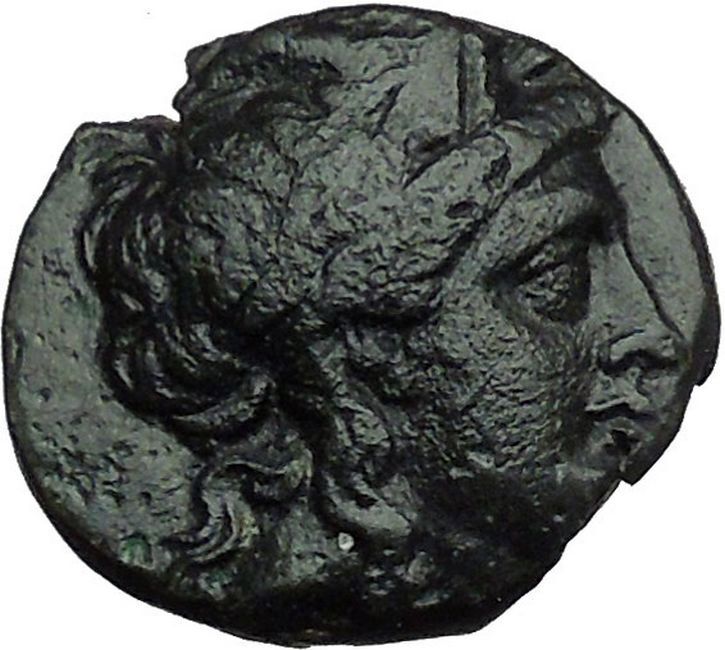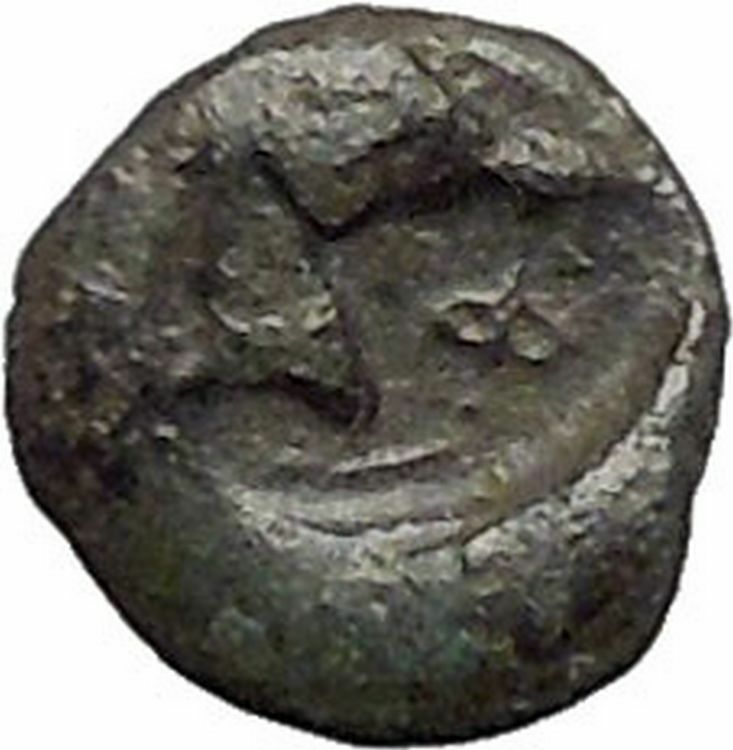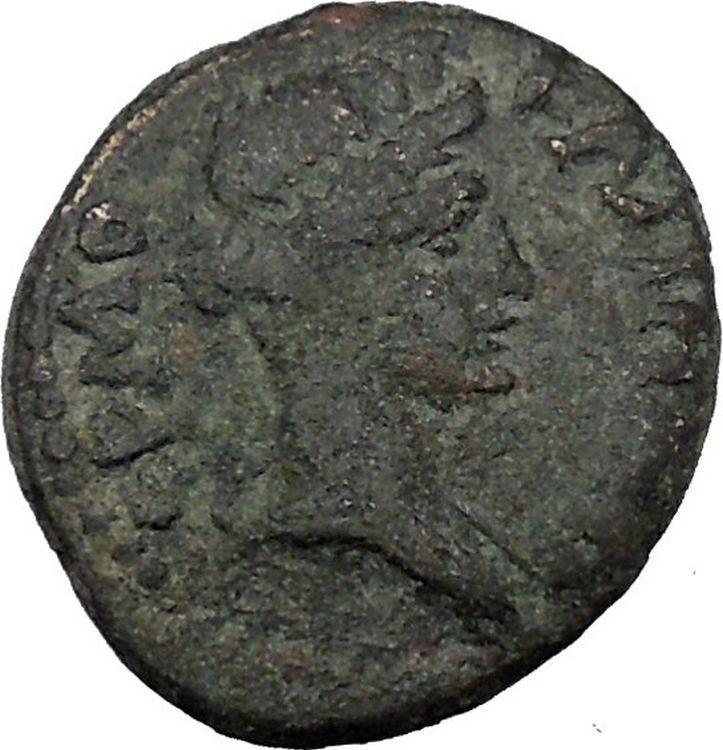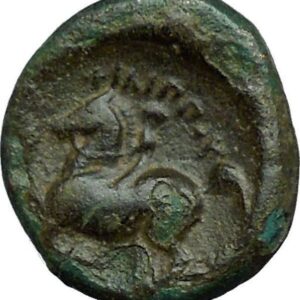|
Greek city of Olympia in Elis
Bronze 19mm (3.94 grams) Struck 2nd Century B.C.
Reference: Sear 2905; B.M.C. 10.150
Certification: NGC Ancients F 4375823-094
Laureate head of Zeus right.
FA / ΛEI / ΩN within olive-wreath.
A fertile country in the north-west of the Peloponnese, Elis possessed the famous festival center of Olympia where the Greeks celebrated the Olympic Games every four years. The coinage in the name of the Eleans was issued not from the city of Elis itself, but from the festival center, in connection with each Olympic gathering.
You are bidding on the exact item pictured, provided with a Certificate of Authenticity and Lifetime Guarantee of Authenticity.
![The Jupiter de Smyrne, discovered in Smyrna in 1680[1]](https://upload.wikimedia.org/wikipedia/commons/thumb/c/c8/Jupiter_Smyrna_Louvre_Ma13.jpg/200px-Jupiter_Smyrna_Louvre_Ma13.jpg) In the ancient Greek religion, Zeus was the “Father of Gods and men” who ruled the Olympians of Mount Olympus as a father ruled the family. He was the god of sky and thunder in Greek mythology. His Roman counterpart is Jupiter and Etruscan counterpart is Tinia. In the ancient Greek religion, Zeus was the “Father of Gods and men” who ruled the Olympians of Mount Olympus as a father ruled the family. He was the god of sky and thunder in Greek mythology. His Roman counterpart is Jupiter and Etruscan counterpart is Tinia.
Zeus was the child of Cronus and Rhea, and the youngest of his siblings. In most traditions he was married to Hera, although, at the oracle of Dodona, his consort was Dione: according to the Iliad, he is the father of Aphrodite by Dione. He is known for his erotic escapades. These resulted in many godly and heroic offspring, including Athena, Apollo and Artemis, Hermes, Persephone (by Demeter), Dionysus, Perseus, Heracles, Helen of Troy, Minos, and the Muses (by Mnemosyne); by Hera, he is usually said to have fathered Ares, Hebe and Hephaestus.
As Walter Burkert points out in his book, Greek Religion, “Even the gods who are not his natural children address him as Father, and all the gods rise in his presence.” For the Greeks, he was the King of the Gods, who oversaw the universe. As Pausanias observed, “That Zeus is king in heaven is a saying common to all men”. In Hesiod’s Theogony Zeus assigns the various gods their roles. In the Homeric Hymns he is referred to as the chieftain of the gods.
His symbols are the thunderbolt, eagle, bull, and oak. In addition to his Indo-European inheritance, the classical “cloud-gatherer” also derives certain iconographic traits from the cultures of the Ancient Near East, such as the scepter. Zeus is frequently depicted by Greek artists in one of two poses: standing, striding forward, with a thunderbolt leveled in his raised right hand, or seated in majesty.
Olympia (Greek: Ολυμπία Olympí’a, older transliterations, Olimpia, Olimbia), a sanctuary of ancient Greece in Elis, is known for having been the site of the Olympic Games in classical times, comparable in importance to the Pythian Games held in Delphi. Both games were held every Olympiad (i.e. every four years), the Olympic Games dating back possibly further than 776 BC. In 394 AD ( after exactly 1170 years ) emperor Theodosius I abolished them as they were then considered reminiscent of paganism. The first olympic games were in Olympia in honor of Zeus.

The sanctuary, known as the Altis, consists of an unordered arrangement of various buildings. Enclosed within the temenos (sacred enclosure) are the Temple of Hera (or Heraion/Heraeum) and Temple of Zeus, the Pelopion and the area of the altar, where the sacrifices were made. The hippodrome and later stadium were also to the east.
To the north of the sanctuary can be found the Prytaneion and the Philippeion, as well as the array of treasuries representing the various city states. The Metroon lies to the south of these treasuries, with the Echo Stoa to the East. To the south of the sanctuary is the South Stoa and the Bouleuterion, whereas the West side houses the Palaestra, the workshop of Pheidias, the Gymnasion and the Leonidaion.
Olympia is also known for the gigantic ivory and gold statue of Zeus that used to stand there, sculpted by Pheidias, which was named one of the Seven Wonders of the Ancient World by Antipater of Sidon. Very close to the Temple of Zeus which housed this statue, the studio of Pheidias was excavated in the 1950s. Evidence found there, such as sculptor’s tools, corroborates this opinion. The ancient ruins sit north of the Alfeios River and Mount Kronos (named after the Greek deity Kronos). The Kladeos, a tributary of the Alfeios, flows around the area. Its located in the part of Greece which is called Peloponesse. In ancient greece Olympia was sacred ground to the greeks.
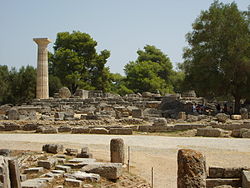
|








![The Jupiter de Smyrne, discovered in Smyrna in 1680[1]](https://upload.wikimedia.org/wikipedia/commons/thumb/c/c8/Jupiter_Smyrna_Louvre_Ma13.jpg/200px-Jupiter_Smyrna_Louvre_Ma13.jpg)




